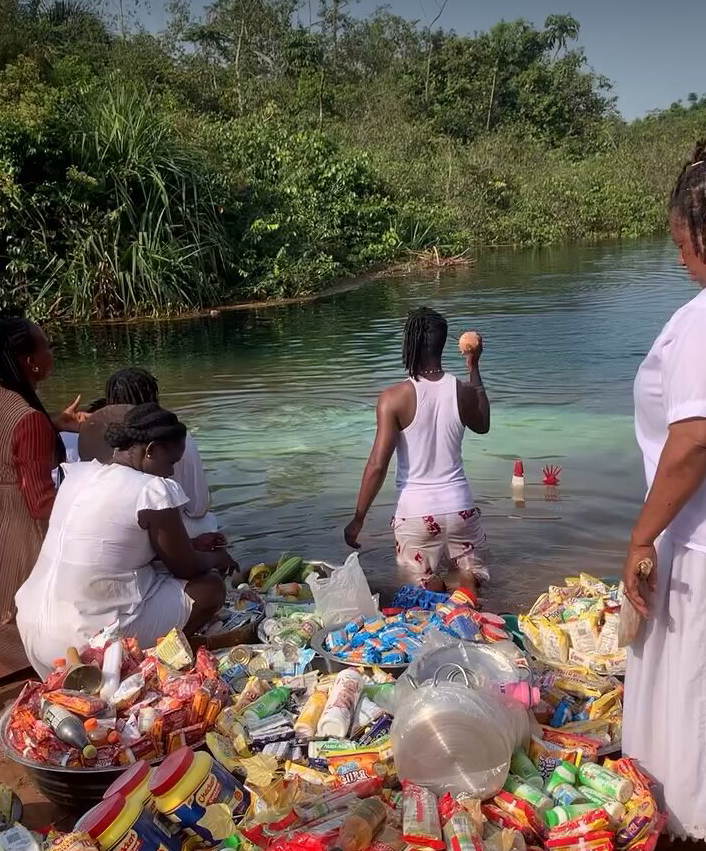
Nigerian Man Buys Truckloads of Food, Dumps Them into River as Sacrifice to Please His Gods

Residents of a quiet riverside community in southern Nigeria were left in shock after a man reportedly bought several truckloads of food items, only to dump them into a river as a form of sacrifice to his gods. The bizarre incident, which took place earlier this week, has since sparked a nationwide conversation about faith, traditional beliefs, and the growing tension between spirituality and economic reality in a country grappling with hunger and rising food prices.
Eyewitnesses say the man, identified simply as “Chief” by locals, arrived at the riverbank accompanied by several young men and traditional worshippers dressed in white garments. The convoy reportedly included multiple trucks loaded with bags of rice, tubers of yam, cartons of noodles, palm oil, drinks, and livestock. According to accounts, the group offloaded the goods under the supervision of native priests, chanting and offering prayers before throwing the items into the flowing river.
Videos of the spectacle have since surfaced online, showing stunned onlookers recording as bags of rice were tossed into the water, while the sound of traditional drums and incantations filled the air. In one of the clips, a voice could be heard saying, “These are offerings to our gods. They have accepted them.” The viral footage has generated thousands of reactions on social media, with Nigerians expressing a mix of disbelief, outrage, and curiosity.
Some commentators condemned the act as wasteful and insensitive, especially at a time when millions of Nigerians are struggling to afford daily meals. “People are sleeping hungry every night, and someone is throwing food into the river to please spirits? This is madness,” one user wrote on X (formerly Twitter). Another added, “This is the height of ignorance. Even the gods will be angry at this waste.”
However, others defended the man’s actions, arguing that traditional worshippers have the right to express their faith however they deem fit. “You go to church and donate millions for thanksgiving, some people slaughter cows in mosques for charity. Why is it suddenly wrong when someone performs his traditional sacrifice?” a commenter asked. “Not everything is about logic — spirituality doesn’t follow human reasoning.”
According to reports gathered from locals, the man is believed to be a wealthy businessman who recently faced a series of personal and financial challenges. He had allegedly consulted a traditional priest who instructed him to make a large offering to appease the river goddess for restoration and protection. The priest, known in the area for his powerful rituals, reportedly specified that the offering must be made with abundance — symbolizing overflowing blessings and a complete renewal of fortune.
Community elders who spoke to journalists said the practice, though rare on such a large scale, is rooted in ancient customs that view rivers as sacred entities capable of granting prosperity and cleansing misfortune. “Our ancestors have always offered gifts to the waters,” one elder explained. “In those days, people would bring yams, palm oil, and even livestock to thank the gods for blessings. What he did may look extreme to outsiders, but in his belief system, it is an act of faith.”
Still, the act has triggered outrage among humanitarian groups and social commentators who view it as a symbol of misplaced priorities in a nation facing severe economic hardship. Nigeria has been battling rising inflation, food scarcity, and a soaring cost of living, with the prices of basic commodities doubling or tripling in recent months. The thought of truckloads of food being dumped into a river — rather than distributed to needy families — has therefore struck a raw nerve among citizens.
“People are dying of hunger while others are feeding spirits,” lamented a community youth leader. “Even if you must make a sacrifice, at least feed the living first. The gods will not eat rice or noodles.” Others have called on religious authorities and traditional leaders to educate worshippers on more responsible ways of practicing their faith, especially in a country where food insecurity continues to rise.
Interestingly, a few spiritual voices have come forward to interpret the act differently. A traditional priest from Ogun State, who requested anonymity, told reporters that sacrifices are not meant to be understood in literal terms. “When a man gives to the gods, it is a form of energy exchange. You give what is valuable to you, and in return, you attract what you desire. The food is not for the gods to eat — it is a symbolic act of surrender,” he said. “Western religions do similar things through tithes and offerings. It only looks different.”
Meanwhile, environmentalists have expressed concern over the pollution risks posed by dumping food and materials into natural waterways. Experts warn that such large-scale disposal could contaminate the river, affect aquatic life, and pose health risks to nearby communities that rely on the water for drinking and domestic use. “This is not just a spiritual issue — it’s an environmental one,” said a spokesperson for a local conservation group. “Rotting food and packaging materials can damage the ecosystem, block water flow, and attract disease-carrying insects.”
Authorities have yet to issue an official response, but local sources say environmental officers may be dispatched to assess the impact of the dumping. While traditional worship is constitutionally protected under Nigerian law, acts that harm public resources or endanger communities may attract penalties under environmental protection statutes.
As the story continues to trend, the debate over faith, freedom, and responsibility has deepened across Nigeria. For some, the act is a reflection of the enduring influence of traditional religion in a country often portrayed as divided between Christianity and Islam. For others, it highlights the deep contradictions of a society where poverty coexists with ostentatious displays of wealth — and where spirituality sometimes collides with common sense.
One commentator captured the mood succinctly: “This incident is more than just about a man throwing food into the river. It’s a mirror of who we are — a people torn between modernity and tradition, faith and reason, poverty and power.”
Despite the controversy, the man at the center of it all remains silent. Those close to him claim he has since gone into seclusion for post-sacrificial purification and meditation. Meanwhile, the riverbank where the event took place has reportedly become a minor tourist attraction, with curious residents trooping in to see the site of what many now call “the river of sacrifice.”
Whether viewed as an act of faith, folly, or desperation, the incident has undeniably struck a chord across Nigeria. It exposes the raw intersection of belief and survival in a society where people are constantly seeking answers — sometimes through prayer, sometimes through science, and sometimes through acts that defy logic entirely. For now, the river flows on, carrying with it not only the remains of food offerings but also the questions and contradictions of a nation still searching for balance between the spiritual and the sensible.
Drama as Nigerian man buys truckloads of food, only to dump them into a river as sacrifice to please his gods. pic.twitter.com/iuRDyy1hhl
— Linda Ikeji Blog (@lindaikeji) November 2, 2025


